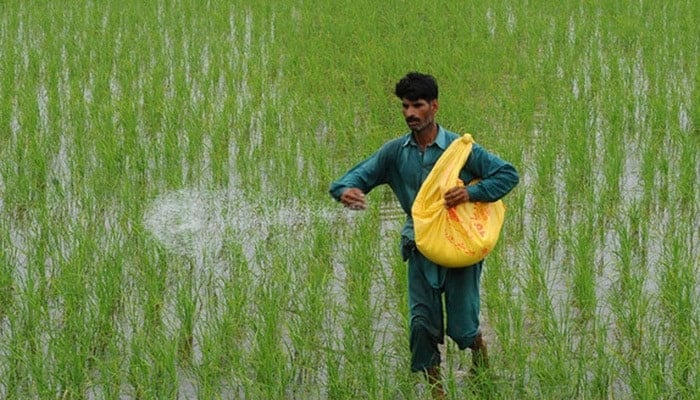Fertiliser stockpiles enough for Rabi season
Rabi season, starts from October and ends in March, primarily produces wheat, barley, and pulses
ISLAMABAD: The Fertiliser Review Committee (FRC) assured farmers on Friday that Pakistan’s fertiliser reserves are sufficient to meet the demand for the upcoming Rabi season, with adequate supplies of both DAP and urea fertilisers.
The committee, chaired by Federal Minister for Industries, Production, and National Food Security Rana Tanveer Hussain, was convened to assess stock levels and ensure the availability of essential fertilizers for the 2024-25 Rabi season. The Rabi season, starts from October and ends in March, primarily produces wheat, barley, and pulses.
Minister Hussain highlighted a significant increase in the demand for DAP fertiliser, attributing a 44 per cent surge in offtake to the Punjab government’s Kisan Card initiative. The October 2024 estimate for DAP offtake stood at 309,000 tonnes, up from 215,000 tonnes the previous month. This surge is driven by Rs 75 billion in interest-free loans disbursed to 500,000 farmers under the Punjab government’s Kisan Card program, which provides Rs30,000 per acre for seeds, phosphorus, and nitrogen.
“Farmers have already drawn Rs18 billion to procure fertiliser,” said Hussain, adding that the trend of increased DAP usage is expected to continue through November and December 2024. The initiative is intended to encourage the balanced application of fertilizers for higher crop yields.
The committee reaffirmed that additional fertilizer stocks are in place to meet the demand, ensuring no disruptions for farmers as they prepare for the Rabi season. Rana Tanveer emphasized the importance of farmers’ prosperity for the country’s economic growth and urged provincial authorities to take stringent measures against hoarding and price manipulation.
The meeting was attended by key officials, including Saif Anjum, Secretary of the Ministry of Industries, and Ali Tahir, Secretary of the Ministry of National Food Security, alongside representatives from the Ministry of Finance, Commerce, and provincial governments.
-
 Winter Olympics 2026: Top Contenders Poised To Win Gold In Women’s Figure Skating
Winter Olympics 2026: Top Contenders Poised To Win Gold In Women’s Figure Skating -
 Inside The Moment King Charles Put Prince William In His Place For Speaking Against Andrew
Inside The Moment King Charles Put Prince William In His Place For Speaking Against Andrew -
 Will AI Take Your Job After Graduation? Here’s What Research Really Says
Will AI Take Your Job After Graduation? Here’s What Research Really Says -
 California Cop Accused Of Using Bogus 911 Calls To Reach Ex-partner
California Cop Accused Of Using Bogus 911 Calls To Reach Ex-partner -
 AI Film School Trains Hollywood's Next Generation Of Filmmakers
AI Film School Trains Hollywood's Next Generation Of Filmmakers -
 Royal Expert Claims Meghan Markle Is 'running Out Of Friends'
Royal Expert Claims Meghan Markle Is 'running Out Of Friends' -
 Bruno Mars' Valentine's Day Surprise Labelled 'classy Promo Move'
Bruno Mars' Valentine's Day Surprise Labelled 'classy Promo Move' -
 Ed Sheeran Shares His Trick Of Turning Bad Memories Into Happy Ones
Ed Sheeran Shares His Trick Of Turning Bad Memories Into Happy Ones -
 Teyana Taylor Reflects On Her Friendship With Julia Roberts
Teyana Taylor Reflects On Her Friendship With Julia Roberts -
 Bright Green Comet C/2024 E1 Nears Closest Approach Before Leaving Solar System
Bright Green Comet C/2024 E1 Nears Closest Approach Before Leaving Solar System -
 Meghan Markle Warns Prince Harry As Royal Family Lands In 'biggest Crises' Since Death Of Princess Diana
Meghan Markle Warns Prince Harry As Royal Family Lands In 'biggest Crises' Since Death Of Princess Diana -
 Elon Musk Weighs Parenthood Against AI Boom, Sparking Public Debate
Elon Musk Weighs Parenthood Against AI Boom, Sparking Public Debate -
 'Elderly' Nanny Arrested By ICE Outside Employer's Home, Freed After Judge's Order
'Elderly' Nanny Arrested By ICE Outside Employer's Home, Freed After Judge's Order -
 Keke Palmer On Managing Growing Career With 2-year-old Son: 'It's A Lot'
Keke Palmer On Managing Growing Career With 2-year-old Son: 'It's A Lot' -
 Key Details From Germany's Multimillion-euro Heist Revealed
Key Details From Germany's Multimillion-euro Heist Revealed -
 David E. Kelley Breaks Vow To Cast Wife Michelle Pfeiffer In 'Margo's Got Money Troubles'
David E. Kelley Breaks Vow To Cast Wife Michelle Pfeiffer In 'Margo's Got Money Troubles'




